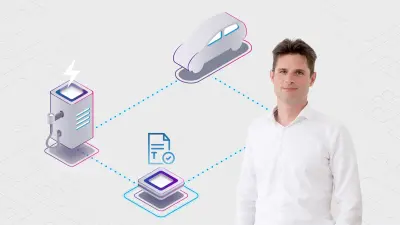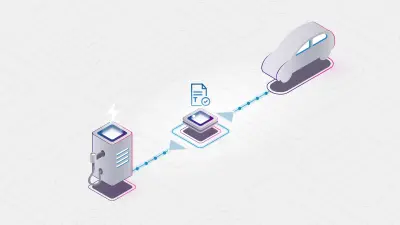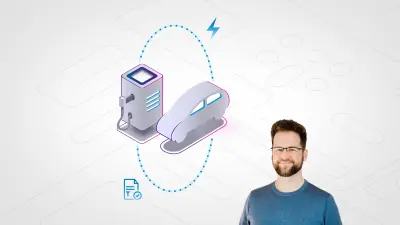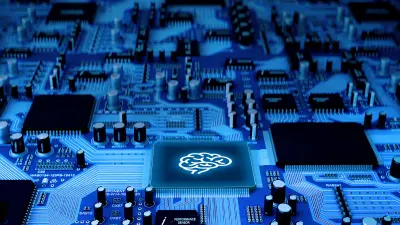Economy of Things: DLT enable things with business model

What are the possibilities if things could actually operate businesses autonomously? And what are the challenges in implementing this? Nik Scharmann, Project Director for “Economy of Things” at Bosch, sees plenty of potential — but also plenty of work.
Two parties agree on a deal; the transaction is checked and verified. The deal is then contractually confirmed, all parties are satisfied. Distributed Ledger Technologies (DLT) ensure that in future no humans need to be involved in this entire process. “We are looking at a very exciting development,” says Nik Scharmann, Project Director for “Economy of Things” at Bosch.
He calls it a “refinement of the internet.” The technical aspect of how this second phase in achieving the economy of things is implemented, was explained in the first part of our “Chain reaction” series. In this second part, we discuss the challenges of implementation and the possible consequences for how we process transactions.
DLT open the door
Nik Scharmann already has a very clear idea of how things might look at some point.
And of course, he is closely involved with current projects, such as, for example, electric cars which autonomously negotiate and pay the electricity price with the charging station. Thanks to Distributed Ledger Technologies and their transparent, secure, and decentralized network systems, there is a uniform infrastructure to form the platform for this implementation. But Scharmann is mainly interested in where all this could lead in the next step.
“It becomes really interesting if the vehicle is able to implement its own business model.”

The car as contractor
So Nik’s question is: “How will the Economy of Things look when for example cars are truly autonomous?” And he answers the question immediately: “It becomes really interesting if a vehicle is able to implement its own business model.” This could for example mean reducing operating costs again. The vehicle, like a company or person, tries to generate income — largely independently. “Vehicles would for example manage themselves”, says Scharmann. “And if I needed a vehicle, I would order one, it would turn up, conclude a smart contract and take me to my destination.”
Marketplace for all
The basis for such intellectual games are platforms based on DLT systems. “They are like a mediaeval marketplace”, explains Scharmann. “There are certain rules which the dealers can rely on and which allow them to process transactions.”
In the conventional internet world, individual monopoly holders largely set the rules. In the — for Scharmann — desirable world of the Economy of Things, everyone using the marketplace works on the rulebook.

“We’re operating a type of nation-building in the digital environment.”
Great challenges
On the way to this goal, according to Scharmann, there are three challenges to overcome.
“Firstly, the technical question: how can we achieve scalability, i.e. lots of traffic on the platform, without facing huge problems in energy terms. The key: consensus algorithms. There are already some initial answers here, such as, for example, Second Layer protocols.” Also, Scharmann wants to promote the idea of this cooperative approach. He says: “Let’s try to fulfil the promise of IoT using cooperatively run platforms instead of a monopolistic platform approach in which each IoT company represents itself.” With such a model, business can be done well with products plus software or services although many co-players are needed. “But the industry must first understand that this could perhaps be one way of combining strengths.”
And the third point: “In such a cooperative, how do we control who has what rights for making which refinements of the system?” So a DLT system based on linking many vehicles would be a very valuable system. The challenge: how can this system be refined in the way the system users think is right? “For this, there has to be voting rights and various bodies authorized to make decisions.” Scharmann and his team are therefore researching governance. “It must be an independent legal entity with non-profit character.” “Fundamentally,” according to Scharmann, “it’s about a type of nation-building in the digital environment”.
Profile

Nik Scharmann, 43
Project Director “Economy of Things”, Bosch
Distributed ledger technologies are a social innovation.
Nik Scharmann has been leading Bosch’s research activities in the field of the Economy of Things since 2017. Before that, he was a researcher in the energy technology field at Bosch Rexroth, where he began his career as a trainee in 2002.


